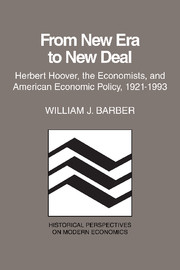Book contents
- Frontmatter
- Contents
- Preface
- Prologue: The vision of a new era in the 1920s
- 1 The ingredients of a model of a new economics
- 2 Challenges to the new economics of the 1920s
- 3 The new economics at center stage in 1929
- 4 Activating the stabilization model in late 1929 and 1930
- 5 Preliminary readings of the results of the stabilization strategy
- 6 The unraveling of the first official model in 1931
- 7 Shifting course in late 1931 and early 1932
- 8 Renewing the offensive in February and March 1932
- 9 The economists and their views on policy for 1932
- 10 Official model II as shaped in May 1932 and the aftermath
- Epilogue: Transition to the New Deal – continuities and discontinuities
- Notes
- Selected bibliography
- Index
9 - The economists and their views on policy for 1932
Published online by Cambridge University Press: 19 October 2009
- Frontmatter
- Contents
- Preface
- Prologue: The vision of a new era in the 1920s
- 1 The ingredients of a model of a new economics
- 2 Challenges to the new economics of the 1920s
- 3 The new economics at center stage in 1929
- 4 Activating the stabilization model in late 1929 and 1930
- 5 Preliminary readings of the results of the stabilization strategy
- 6 The unraveling of the first official model in 1931
- 7 Shifting course in late 1931 and early 1932
- 8 Renewing the offensive in February and March 1932
- 9 The economists and their views on policy for 1932
- 10 Official model II as shaped in May 1932 and the aftermath
- Epilogue: Transition to the New Deal – continuities and discontinuities
- Notes
- Selected bibliography
- Index
Summary
Hoover had reoriented his campaign against depression in late 1931. The final goal remained the same: revitalization of the economy through the recovery of spending. But new circumstances had dictated a shift in the policy mix. The environment that provoked reassessments in official quarters might also have been expected to inspire new thinking among the economists. Certainly the course of events had diverged substantially from the expectations of both the more orthodox neoclassicists and the champions of stabilization strategies of the new era. Members of the former school had typically held that the economy's natural mechanisms should have produced some evidence of an upturn by early 1932 – but that had not happened. Those of the latter persuasion were also disappointed. Their hopes that the deployment of the first official model would dampen and shorten a downturn had been dashed. None of them, however, had given systematic thought before the fact to the possibility that the institutional fabric of the financial system might reach the state it did in late 1931. The viability of this crucial component of a modern economic system had been accepted as a given when the original prognoses on the course of depression had been offered.
While groping for new intellectual moorings, Hoover himself did not significantly widen the small circle of academic economists with whom he conferred. He was, however, the recipient of a lot of unsolicited advice from members of the academy.
- Type
- Chapter
- Information
- From New Era to New DealHerbert Hoover, the Economists, and American Economic Policy, 1921–1933, pp. 146 - 168Publisher: Cambridge University PressPrint publication year: 1985



